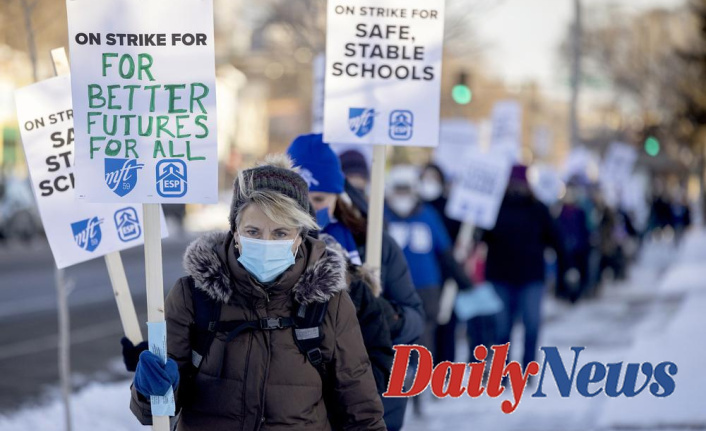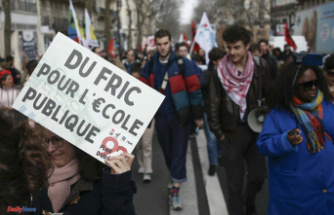The strike had left some 29,000 students without school and nearly 4,500 educators and staff at large in one of Minnesota's largest schools districts.
The teachers' and support staff union planned to release details later in today, but stated that it had achieved its goals when its members walked out of the job on March 8 after being unable to reach an agreement with the district leaders. Over the weekend, ratification votes were expected.
Superintendent Ed Graff stated that he is looking forward to welcoming staff and students back to school Monday. Union leaders however stated that talks were continuing Friday afternoon to reach an agreement on a return to work.
"These historic agreements include important wins for students and safe and stable schools that they deserve," said the Minneapolis Federation of Teachers and Education Support Professionals in a statement. They also stated that major gains were made in pay for Education Support Professionals and protections for educators of colour, class sizes caps and mental support for students.
Union leaders announced that they would soon send details to their members at a rally and news conference outside the district headquarters. The gains include higher starting wages for low-paid workers and exempting teachers of color from seniority based layoffs. They claimed that this could be a model for other unions.
Shaun Laden, the head of the union’s education support professionals unit, stated that "the collective action of our member has shown that strikes can work." "We are aware that fundamental changes were needed in Minneapolis Public Schools. That was part of what this is all about.
Greta Callahan is the head of the union's teachers group. She said that they achieved significant gains in the crucial issue of mental health support for students by having a doubled number of counselors and nurses in elementary schools and one social worker in each building. However, she acknowledged that they received less than they expected.
Laden acknowledged that some gains may be temporary as they are dependent on federal coronavirus relief money.
Graff did not give any details at the earlier news conference about the contract, but said that he believes it is fair for teachers and staff.
Kim Ellison, Chair of the School Board, thanked students and their patience.
She said, "I know that the past two weeks have proved difficult and lengthy for many of our students and many of you," "You've missed your teachers, you've missed your school, you've missed your friends. I am so happy that you are able to go back to school Monday. Your teachers will be thrilled to have you back.
A teachers strike began Friday in Sacramento, California. Unions representing 2,800 teachers, and 1,800 school workers joined the picket line Wednesday to protest over staffing and pay. The Sacramento City Unified Schools District cancelled classes at its 76 schools, which affected 43,000 students.
Unions across the country are taking advantage of tight labor markets in order to regain some power they feel they have lost over the past decades. Experts predict that there will be more labor strife after the country recovers from the pandemic. The administration of President Joe Biden is looking at changes that might make it easier to organize federal workers and contractors.
Minneapolis' first teacher walkout since 1970 sent families that had suffered the worst days of the coronavirus pandemic panicking about their academic progress and trying to find child care. To provide safe spaces for students to meet and receive meals, churches, Boys and Girls Clubs and YMCAs opened their doors. High school students organized a series solidarity actions to support teachers. This included a sit-in at the district headquarters all night.
Erin Zielinski was the mother of a first-grader at Armatage Elementary school in south Minneapolis. She welcomed the news of the settlement by writing "Hallelujah!" Her husband also said that they were supporting the teachers as they worried about whether the district would be able to meet their demands.
She said, "I am relieved that the union accepted an offer to continue providing schools that are safe and good." "This was a major reason we moved to Minneapolis."
Throughout the talks, Minneapolis Public Schools officials and members of the school board insisted that they did not have enough money to pay teachers' demands, particularly for permanent salary increases. Graff said Friday to reporters that the two new contracts with teachers and support staff would require them to "take a look at their budgets and make some adjustments going ahead" in the weeks and months to come.
The union stated that they walked out together to change the MPS's trajectory and give educators more control over how they do their work. "This too was achieved and will have positive impacts on our district for many years to come."
The night before the Minneapolis teachers walked off, teachers in St. Paul came to a tentative agreement. It was similar to the one their Minneapolis counterparts wanted. Union leaders also cited this as evidence that Minneapolis administrators were open to compromise.
Ben Polk, a special education assistant, stated that he was happy with the settlement, but wanted to know more details before commenting further. Polk stated earlier that understaffing meant that aides like him had to care for too many students at once, making it more difficult both for teachers and students.
Graff stated that schools may need to add school days in June due to the loss of time. However, the details were still to be decided.












